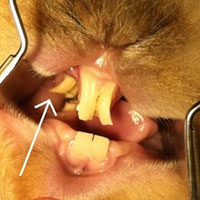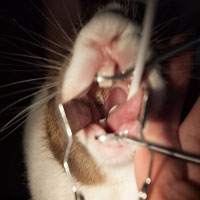Worming
New Worming Advice
We no longer recommend regular worming for all pet rabbits. Most rabbits carry few significant intestinal parasites (unlike dogs and cats!!).
Rabbits do carry and suffer disease from a brain and kidney parasite called E. cuniculi. This can cause significant disease in pet bunnies, and is very widespread (studies show 50% of UK rabbits have been exposed). On acquiring any new rabbit, we STRONGLY RECOMMEND a preventative course of a drug to reduce/eliminate any infestation he/she may be carrying. Currently, it is our understanding that once this has been done, we don’t believe any routine worming is necessary going forward, as long as all new additions are treated on acquisition.
Very importantly, it is suspected that an ill and/or immunosuppressed human (eg. on chemotherapy), may contract this disease from a pet rabbit. Theoretically the parasite is capable of causing severe human illness. To the best of our knowledge this transfer has never been documented, however we recommend speaking to your medical advisor if you are concerned. You may choose to simply using the drug every few months on your rabbit as an extra peace-of-mind ‘belt-and-braces’ prevention.
Please call in to the clinic to collect this simple, inexpensive wormer.
Feeding
Many rabbits are fad-eaters, and will select certain feedstuffs, leaving others. This can result in severe dietary imbalances, and can cause osteoporosis and paralysis. We recommend all rabbits have access to long fibre (good quality hay is ideal) every day. This is important for dental and digestive health. We prefer rabbits are fed on an extruded diet than a flaked meal diet – this prevents selective feeding – we sell an excellent extruded diet suitable for both rabbits and guinea pigs, called Supreme. These diets should be weighed out daily to avoid obesity, a growing problem in rabbits. Rabbits have a complex digestive system and must eat and pass faeces every day. A rabbit that hasn’t eaten in over 8 hours is a medical emergency! Fresh vegetables can also be offered, but avoid large quantities of kale, savoy cabbage or spinach, as these are high in calcium and can lead to the formation of bladder stones and sludge.
For many, many people now, rabbits are an important member of the family. We understand this, and can offer the latest treatments, to a high standard. We neuter rabbits almost daily, and attend many sick bunnies every week.
Dental Problems
The fact that rabbit teeth never stop growing means that if the incorrect diet is fed, or indeed if your wee one is unlucky enough to have a genetic quirk which causes teeth misalignment, then terribly sharp spurs develop on the cheek teeth.

These lacerate the tongue and/or cheeks, and cause severe pain. Incisors can be removed if they are part of the problem, but molars are really difficult to deal with, and we frequently resort to regular teeth burring. Teeth clipping has now thankfully been discontinued as normal practice in favour of burring – teeth would often shatter when clipped so we do not recommend that procedure at all. Part of the problem with the teeth is abscessation or impaction of roots, causing abscesses in the skull. We can assess these issues with a high quality digital skull x-ray as well as a full assessment under general anaesthetic. As often is the case: prevention is MUCH better than cure – please do follow the dietary advice above, and if you suspect any problems with the mouth do present to the vet as promptly as possible. Early intervention can be a lifesaver with rabbit dentistry!
Below shows an image of normal molars (RHS) and no sign of tongue or cheek damage

Grooming
Regular Grooming and brushing of long haired rabbits is recommended to prevent hairball formation which can lead to bowel obstruction.
Rabbit Pet Health Plan
Don’t forget to check out our Rabbit Pet Health Plan, the easy affordable way to spread the cost of all your rabbit’s healthcare needs.
Rabbit Care - Neutering
As well as caring for your pet when things go wrong, we at can provide advice on keeping your rabbit healthy. Some insurance cover even encourages this by offering vouchers to spend against annual health checks and vaccinations.
It is very important that a rabbit has a compatible friend of the same breed and to keep them together safely, neutering is often the best option. It’s a routine procedure at our practice and we can answer any questions you have about the surgery.
In male rabbits neutering will:
- Make him more amenable to handling – less likely to bite!
- Reduce aggression
- Allow him to be kept in mixed rabbit company without inter-male aggression, or unwanted baby rabbits appearing!
In female rabbits neutering will:
- Reduce aggression
- Makes them better pets
- Stop the development of false pregnancy states – responsible for PMS behaviour in entire female rabbits
- Stops development of pyometra – a womb infection which can cause fatal peritonitis in rabbits.
- Stop the development of cancer of the womb – something which develops in 80% of all un-spayed does – and which is usually fatal because it is very advanced at the time of diagnosis, and therefore cannot be removed surgically
All animals which are neutered at Cedarmount will be given strong pain relief by injection, and this can be topped up with oral pain killers as necessary. You will be given appropriate advice when you collect your pet after the operation. In the majority of cases, the use of modern anaesthesia, pain relief, and the application of gentle tissue handling during the procedures, facilitates discharge home on the same day as the operation. Occasional animals will require an overnight stay, but nearly all are done as day procedures.
We send all animals home with an Elizabethan collar or a nice comfy body suit (Dogease) to assist in minimising any interference with the surgical wound. We are proud of our surgery, most wounds have no skin sutures, utilising a combination of dissolving buried sutures, and flexible tissue adhesives. This greatly reduces the animals desire to lick the wound. No-one wants to have to re-suture a wound – it is your responsibility to stop any animal removing the sutures – please use the collar provided if you think he/she is/may lick excessively at wound.
If, in the unlikely event an animal does work at a wound sufficiently badly to open it, immediately place the collar on, and call for advice. Most are not emergencies and can be left to the next available appointment to be assessed. The exception to this would be in a situation where a body cavity were opened, or where the animal is in pain. Thankfully, such cases are extremely rare. If in doubt, call for advice. Telephone advice is always free!
Advice About An Ill Rabbit
Our first thought when someone says their rabbit is ill, is that it could be very ill. By the time a rabbit shows signs an owner might recognise, the condition is often very advanced – most rabbits will hide the fact that they are suffering, this is a protective response inherited from their ancestor, the wild rabbit.
So, if you do think your rabbit is ill, let us know as soon as possible.
The more ill a rabbit is, the harder it is to treat them. Seriously ill rabbits may require hospitalisation, intensive professional nursing, fluids and medications regularly administered to bring them back from the brink. These days, with advances in veterinary medicine it is perfectly possible for us to provide this type of high level intensive care.
It is often very demanding in terms of the skill and time and sometimes special equipment or medications are needed that don’t tend to be in common usage. Not surprisingly this can be more costly than treating a less serious routine illness. If you have your rabbit insured it means that the survival of your pet need be your only concern and having a policy that offers generous levels of veterinary fee cover is really worth thinking about.
We are lucky to also be able to call on the services of vets who specialise in rabbits and other small pets. Not all of those are local but some insurance cover extends to include travel and accommodation costs to visit one of these specialists with your pet.
Whether you own a specific breed like a Lionhead rabbit, a baby rabbit or a house rabbit, your bunny is likely to have individual needs. When you need advice that’s tailored to your situation you can always talk it through with a member of our practice team.
If you are worried about your bunny please contact us – we have the experience to deal with your problem.